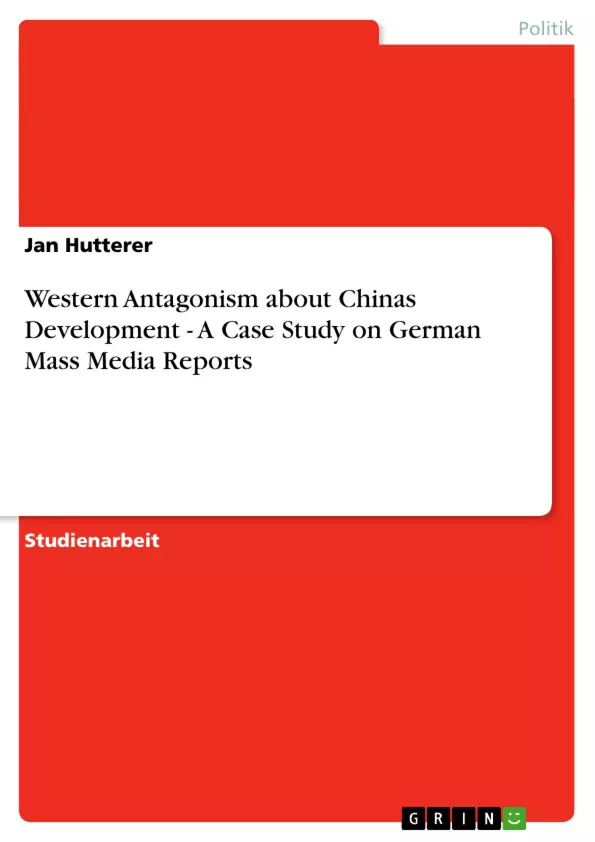China's global influence spreads. Its dynamic development affects our daily life in Western countries. In the past China's economic boom touched daily life in the West most visibly through the "made-in-China" label on everything from clothes to computers. But in recent years the influence reached a new stage which can't be measured anymore just by widgets and gadgets — developments like decreasing consumer prices for textiles, increasing world market prices for natural resources or an increasing global competition influence our daily life. Therefore, much attention has been paid to Chinas rise. This especially holds true for Western media. Scanning western media reports one can observe strong a certain kind of antagonism about China’s development. On one hand, China is pressed for reforms on all fronts. But on the other hand, China’s success causes worries and is often described as a “threat” or “danger” to the western economy. It is not the fact that China’s reforms are criticized, which is striking. Criticism can be an indispensable and valuable tool to accompany a country’s development. It is the overall negativity tenor in the critics in mass media that causes worries.
This paper asks for reasons for this issue and takes German mass media reports as an example to illustrate the ambivalence of perceptions. Are Germans just unsettled when it comes to China’s growth in global economical and political power or is there a certain truth hidden in their perspective?
Inhaltsverzeichnis
- 1. Introduction
- 2. China's Reforms from a German Perspective
- 3. China's Reforms from a Chinese Perspective
- 4. Five Misperceptions and Misunderstandings
- 4.1. Nature of Political System
- 4.2. Nature of Economical Reforms
- 4.3. Nature of Social Reforms
- 4.4. Nature of Chinese foreign politics
- 4.5. Nature of Transition
- 5. Future Challenges and Pitfalls
- 6. Conclusion
- 7. Literature
Zielsetzung und Themenschwerpunkte
Die Arbeit untersucht die kritische Berichterstattung über Chinas Entwicklung in deutschen Massenmedien. Sie zielt darauf ab, die Gründe für den negativen Tenor in der westlichen Medienlandschaft zu analysieren und aufzuzeigen, ob diese Kritik auf realistischen Einschätzungen basiert oder durch Missverständnisse und Vorurteile geprägt ist.
- Chinas Aufstieg als Weltmacht aus deutscher Perspektive
- Die Ambivalenz der Wahrnehmung Chinas in den deutschen Medien
- Fünf gängige Missverständnisse über Chinas politisches, wirtschaftliches und soziales System
- Zukünftige Herausforderungen und Risiken für Chinas Entwicklung
- Die Bedeutung von Dialog und Verständnis für die Beziehung zwischen China und dem Westen
Zusammenfassung der Kapitel
Kapitel 1 bietet eine Einleitung und beschreibt den Kontext der Arbeit. Kapitel 2 untersucht die deutsche Wahrnehmung von Chinas Reformen und die damit verbundenen Herausforderungen. Kapitel 3 beleuchtet Chinas Selbstbild und die Perspektiven der chinesischen Gesellschaft auf die eigenen Entwicklungen. Kapitel 4 analysiert fünf verbreitete Missverständnisse über Chinas politisches, wirtschaftliches und soziales System sowie die chinesische Außenpolitik. Kapitel 5 beschäftigt sich mit zukünftigen Herausforderungen und Risiken für Chinas Weiterentwicklung. Kapitel 6 bietet eine Schlussfolgerung und fasst die wichtigsten Erkenntnisse der Arbeit zusammen.
Schlüsselwörter
Chinas Entwicklung, deutsche Medien, westliche Wahrnehmung, Missverständnisse, Vorurteile, Reformen, Globalisierung, Wirtschaftswachstum, politische Macht, soziale Transformation, Außenpolitik, internationale Beziehungen, Dialog, Verständnis.
Häufig gestellte Fragen
Wie werden Chinas Reformen in deutschen Medien dargestellt?
Die Berichterstattung ist oft ambivalent: Einerseits werden Reformen gefordert, andererseits wird Chinas Erfolg häufig als Bedrohung für die westliche Wirtschaft skizziert.
Welche Missverständnisse über China analysiert die Arbeit?
Die Arbeit beleuchtet fünf Kernbereiche: die Natur des politischen Systems, wirtschaftliche und soziale Reformen, die chinesische Außenpolitik sowie den Charakter des Transformationsprozesses.
Warum ist die westliche Wahrnehmung oft negativ geprägt?
Der negative Tenor rührt oft von Unsicherheit gegenüber Chinas wachsender globaler Macht und tief sitzenden Vorurteilen über nicht-westliche politische Systeme her.
Wie sieht Chinas Selbstbild im Vergleich zur westlichen Sicht aus?
Während der Westen oft Defizite betont, fokussiert sich die chinesische Perspektive auf die Stabilität, die massive Armutsbekämpfung und den rasanten Modernisierungserfolg.
Welche Rolle spielt das "Made-in-China"-Label heute?
Es hat sich von einer Kennzeichnung für Billigprodukte zu einem Symbol für Chinas tiefgreifenden Einfluss auf den Weltmarkt und die globale Konkurrenz entwickelt.
- Quote paper
- Jan Hutterer (Author), 2007, Western Antagonism about Chinas Development - A Case Study on German Mass Media Reports, Munich, GRIN Verlag, https://www.grin.com/document/71715



